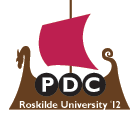| WORKSHOP 104 | MONDAY 09:00-17:00 | ROOM 40-3.25 |
Making futures - Challenging innovation
Abstract. Participatory design has always been about alternative futures: in the practice of (often marginalized) groups in society it has, through design practice, tried to support democratic changes. This started as actions research oriented collaboration with local trade unions at the workplace challenging the use of technology and the management prerogative to define what may count as innovation (Bjerknes et al. 1987).
Today participatory design is more and more taking place beyond the workplace: in public spaces, as engagement with NGOs, and other often marginalized groups. This is in line with its democratic tradition, but it also opens up new ways that we might re-conceptualise innovation as a form of invention (Barry 1999), and challenge the particular, often hegemonic, approaches to future-making in the corporate workplace. . Contemporary managerial ideology embraces ‘the crowd’ as a source of innovation. For example in the form of ‘user driven innovation’, ‘crowd-sourcing’, and focus group testing, with a strong rhetoric of accessible and participative design as a key to ‘democratizing innovation’. All this is often, however, within the perspective of the successful corporation and an unaltered market logic, which privileges particular crowds and particular places as centres of innovation (Suchman 2002): frequently the urban crowd or the perceived exotic,. In the workshop we challenge this logic of innovation by exploring the potential of participatory design cases and fieldwork perspectives that demonstrate a repertoire of differently situated practices of ‘future-making’– futures made locally, in heterogeneous communities, and with marginalised publics. (Björvinsson et al. 2010).
The organizers of the workshop invite participants to share their stories of alternative future making. The first part of the workshop will create a relational map of such cases, and in the second we will explore common themes, relations, and resistances, as well as practical and theoretical challenges.More information: two-page description
Organizers
Pelle Ehn, Malmö University
Laura Watts, IT University
Richard Toppgaard, Malmö University
Elisabet Nilsson, Malmö University
Contact: Pelle Ehn (Pelle.Ehn@mah.se)
